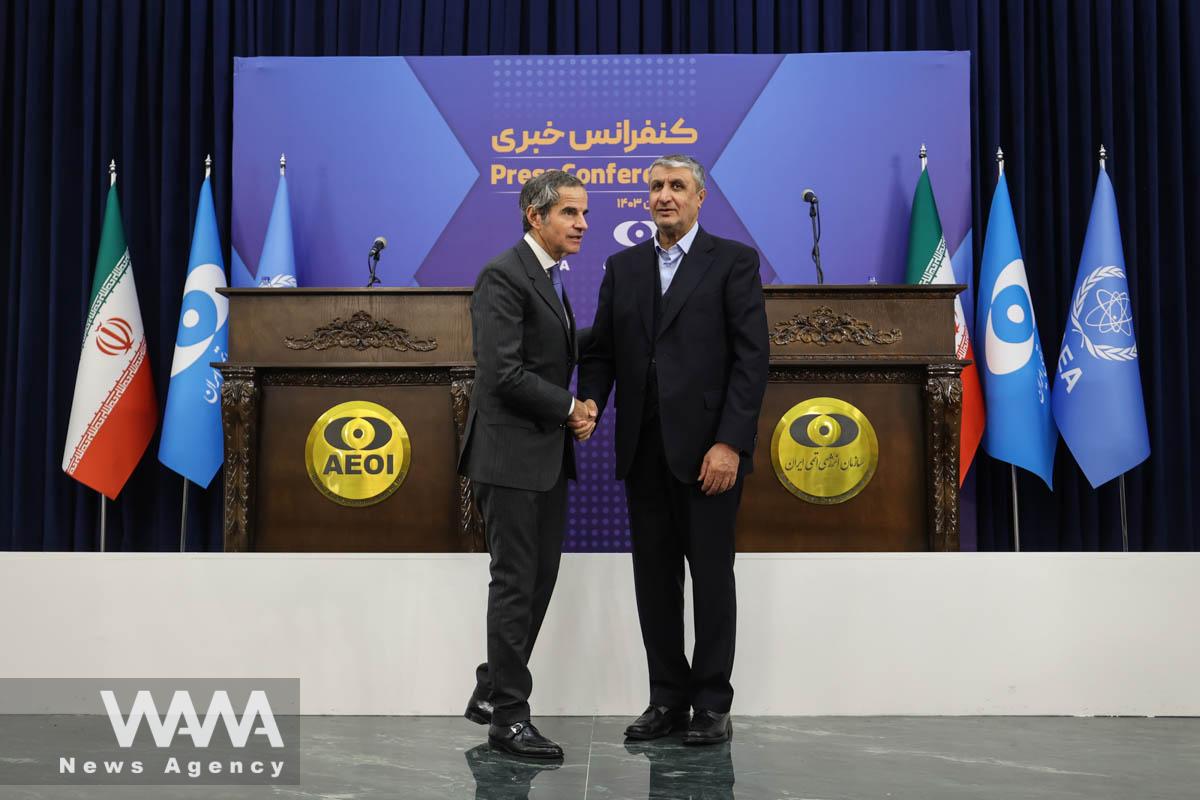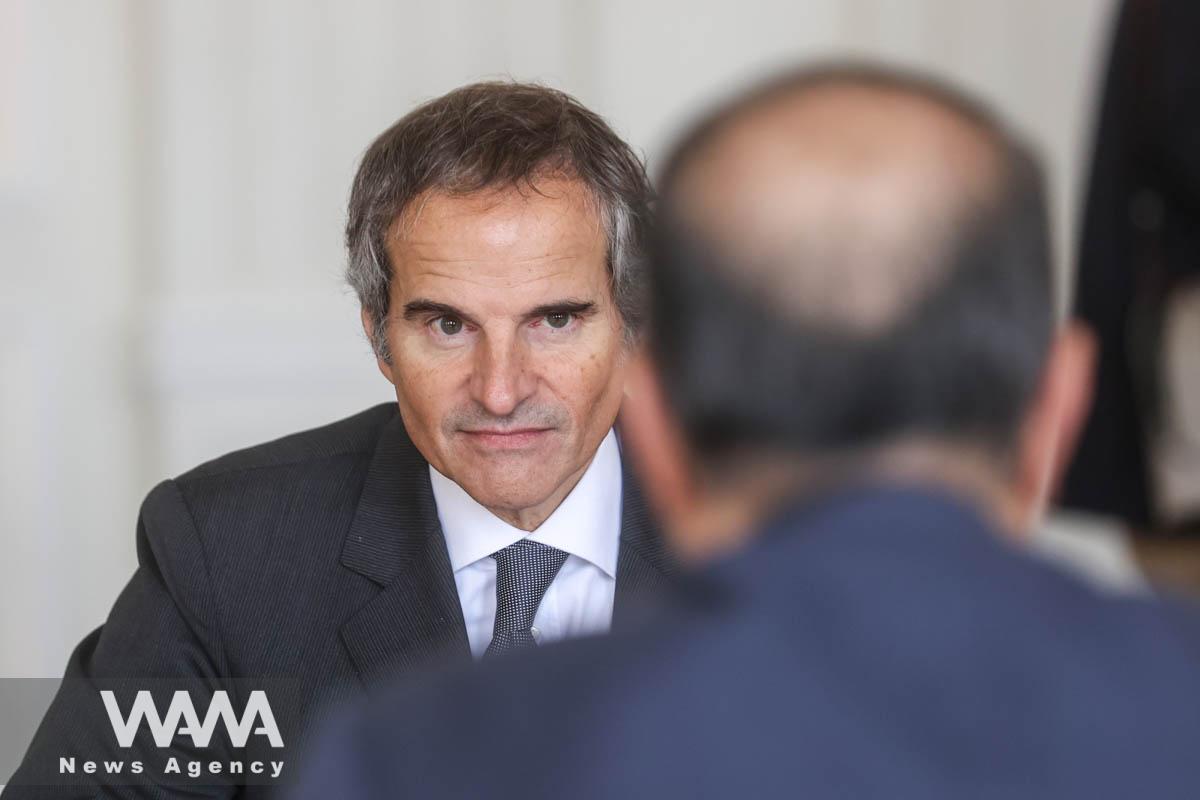JCPOA: Empty Promise or Path to Stability?
WANA (Feb 28) – Diplomacy or Deadlock? This is the lingering question in Iran’s relations with the U.S., the EU, and the International Atomic Energy Agency (IAEA). Every time hopes for a new agreement emerge, conflicting signals from Brussels, Washington, and Vienna cast renewed uncertainty over the situation.
The EU and the IAEA’s approach toward Iran is often driven more by political pressures and external influences than by technical and legal principles. On one hand, the EU advocates for “the necessity of diplomacy,” while on the other, it poisons the negotiation atmosphere with repeated statements and unverified claims about Iran-Russia cooperation in the Ukraine war.
Meanwhile, IAEA Director General Rafael Grossi has further highlighted the contradictions within the agency by accusing Iran of enriching uranium to near-weapons-grade levels. Yet, in a previous speech at Davos, he explicitly stated: “There is no evidence that Iran is moving toward a nuclear weapon.” These contradictions stem more from political pressure than from technical complexities.
New #IAEA Report on #Iran ‘s #Nuclear Program
International Atomic Energy Agency (IAEA):
– The Vienna-based International Atomic Energy Agency (IAEA) reported that as of February 8, Iran had accumulated 274.8 kilograms of uranium enriched up to 60% purity.
– This marks an… pic.twitter.com/XpKtgWcs3D
— WANA News Agency (@WANAIran) February 26, 2025
JCPOA: A Useless Document or a Path to Revival?
“The JCPOA is dead.” This is a phrase frequently echoed by Western politicians. Recently, IAEA Chief Rafael Grossi declared that “the JCPOA is an empty shell” and that Iran should move toward a new agreement. However, while the JCPOA remains in a state of semi-suspension, it is still the only framework that has managed to establish a period of relative stability in Iran’s nuclear dossier.
Mohammad Eslami, head of Iran’s Atomic Energy Organization, insists that “Iran has provided the highest level of cooperation with the IAEA, yet there is a political agenda preventing the acceptance of Iran’s responses.” This claim becomes more understandable considering that Iran has undergone 22% of the IAEA’s global inspections while only possessing 3% of the world’s nuclear capacity.
The IAEA is supposed to be an independent technical body that makes decisions based on impartial scientific data. However, Grossi’s statements and the agency’s contradictory reports suggest that it has transformed from a technical observer into a political tool.
If the IAEA truly seeks transparency, why do Iran’s extensive cooperation efforts—including installing extra surveillance cameras and accepting unprecedented inspections—receive no fair acknowledgment in its reports? Why does the burden of proof not fall on those making allegations against Iran, as per the principle of presumption of innocence?

IAEA’s Rejection of Iran’s Responses is Politically Motivated
WANA (Feb 26) – The head of Iran’s Atomic Energy Organization (AEOI) has accused the International Atomic Energy Agency (IAEA) of acting under political influence by refusing to accept Tehran’s responses to safeguard-related inquiries. “When the IAEA Director-General says Iran should resolve its issues with Trump, it clearly indicates that the matter is political, […]
Europe, Washington, and the Shadow of Political Bias
A major issue in this crisis is Europe’s lack of independent decision-making. Recently, a meeting of EU foreign ministers to discuss a clear strategy on Iran was postponed to March due to a lack of consensus.
Following the cancellation, EU foreign policy chief Kaja Kallas stated that discussions are ongoing: “Our goal is to present a comprehensive conclusion with tangible initiatives and proposals that will define our future approach.”
While Europe is exploring new engagement strategies with Iran, its overall stance on the JCPOA and sanctions has remained largely unchanged.
A decade of nuclear negotiations has shown that neither sanctions, political pressure, nor diplomatic maneuvering can replace genuine dialogue.
Iran’s Atomic Energy Chief has stated: “There is a political agenda preventing the IAEA from accepting Iran’s answers. When the IAEA Director General says that Iran must resolve its issues with Trump, it means the matter is political, not technical.”
Iran has repeatedly expressed its willingness to engage transparently and fairly. But can Europe break free from the shadow of U.S. policies? Can the IAEA return to its principles of impartiality?
If the answer to these questions is no, Iran’s nuclear crisis will enter a new phase of tension. However, if Europe remains genuinely committed to diplomacy, a sustainable agreement is still possible.

International Atomic Energy Agency (IAEA) Director General Rafael Mariano Grossi shake hands with Head of Iran’s Atomic Energy Organization Mohammad Eslami during a news conference in Tehran, Iran, November 14, 2024. Majid Asgaripour/WANA (West Asia News Agency)
Iran Rejects the Language of Threats and Pressure
Iranian President Masoud Pezeshkian remains committed to dialogue with the West on the nuclear issue. Before taking office, he believed negotiations could resolve tensions with the West. However, after just six months in power, he has reached a different conclusion.
Pezeshkian now believes that the West—particularly the U.S.—is not seeking a genuine resolution to Iran’s nuclear issue but is instead pursuing other goals through threats and pressure.
“Some say we have no choice but to negotiate. We never said we wouldn’t negotiate, but we won’t bow to bullies. They want us to lay down all our weapons, sit at the table, and talk—only for them to attack us whenever they wish. What kind of negotiation logic is that?” Pezeshkian stated in a meeting with local officials in western Tehran.
“We Will Not Bow to Bullies”
“We do not shy away from dialogue, but we will not bow to bullies either.”
– Pezeshkian, Iran’s president #Iran #USA pic.twitter.com/qxBXXIN5kI— WANA News Agency (@WANAIran) February 27, 2025
Iranian Foreign Minister Seyed Abbas Araghchi, speaking at a joint conference with his Russian counterpart Sergey Lavrov, made it clear: “The Islamic Republic of Iran will not abandon its right to peaceful nuclear energy under pressure and threats.”
There is no indication that Iran intends to halt its nuclear activities due to Western threats. In fact, Tehran has warned that if further restrictions are imposed on its nuclear program, it may be forced to withdraw from the NPT (Non-Proliferation Treaty) and suspend IAEA inspections if necessary.
IRAN’S NUCLEAR ISSUE
Iran’s nuclear issue revolves around its nuclear program, which has been a subject of international concern, negotiations, and tensions for decades.
Iran insists that its nuclear program is for peaceful purposes, such as energy production and medical research. However, many Western countries, particularly the U.S. and Israel, suspect that Iran has sought to develop nuclear weapons capabilities.
In 2015, Iran signed the Joint Comprehensive Plan of Action (JCPOA) with the P5+1 (U.S., UK, France, China, Russia, and Germany).
In 2018, the Trump administration unilaterally withdrew from the JCPOA and reimposed sanctions on Iran. In response, Iran gradually reduced its compliance with the deal, increasing uranium enrichment and restricting IAEA access.












